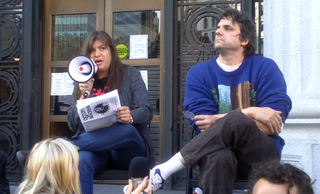A Quote by Annie Dillard
It could be that our faithlessness is a cowering cowardice born of our very smallness, a massive failure of imagination... If we were to judge nature by common sense or likelihood, we wouldnt believe the world existed.
Related Quotes
Nature seems to exult in abounding radicality, extremism, anarchy. If we were to judge nature by its common sense or likelihood, we wouldn't believe the world existed. In nature, improbabilities are the one stock in trade. The whole creation is one lunatic fringe. ... No claims of any and all revelations could be so far-fetched as a single giraffe.
For the 99 percent of the time we've been on Earth, we were hunter and gatherers, our lives dependent on knowing the fine, small details of our world. Deep inside, we still have a longing to be reconnected with the nature that shaped our imagination, our language, our song and dance, our sense of the divine.
Augustine said that we were all born into the world of "common grace" [i.e., available to all]. Before one is baptized, or even if one never is, such grace meets one in God's creation. There is grace in the pear tree that blooms and blushes. There is common grace in the sea (that massive cleanliness which we are proceeding to corrupt), in the fact that there was, before we laid hands on it, clean air. Our task is to appreciate that grace.
We call our intuition our sixth sense, but in reality it would be called our first sense, because it's rooted in quantum nature of reality. It was around long before our solar system and our planetary system were even formulated or even organized. It is at the basis of how our normal sensing works. So instead of being our sixth sense or even â€" using the parapsychological term â€" "extrasensory perception," it's not. It's at the basis of our perception, and that's the quantum world.
Actual life was chaos, but there was something terribly logical in the imagination. It was the imagination that set remorse to dog the feet of sin. It was the imagination that made each crime bear its misshapen brood. In the common world of fact the wicked were not punished, nor the good rewarded. Success was given to the strong, failure thrust upon the weak. That was all.
Our job in this lifetime is not to shape ourselves into some ideal we imagine we ought to be, but to find out who we already are and become it.
If we were born to paint, it’s our job to become a painter.
If we were born to raise and nurture children, it’s our job to become a mother.
If we were born to overthrow the order of ignorance and injustice of the world, it’s our job to realize it and get down to business.
The writing I have in mind and sometimes indulge in myself is concerned, not with plants, mountains or birds as items of scientific description, but with experiences of nature that impinge upon our moods and emotions, enrich our imagination and reveries, and shape our sense of how we stand in relation to the environing world. In a broad sense of the term, this kind of writing is an exercise in phenomenology, an attempt to render the significance that birds, plants or whatever have for us.
By directing our sentiments, passions, and reason toward the common human plight, imagination grants us the advantages of a moralexistence. What we surrender of innocent love of self is exchanged for the safeties and pleasures of belonging to a larger whole. We are born dependent, but only imagination can bind our passions to other human beings.
What a dull universe it would be if everything in it conformed to our expectations, if it held nothing to surprise or baffle us or confound our common sense. A century ago no one foresaw the existence of black holes, an expanding universe, oceans on Jupiter's moons, or DNA. What could be more enriching than to know that we share a common origin with all living things, that we are kin to chimpanzees, redwoods and mollusks? And isn't it a source of wonder to realize that the iron in our blood and the calcium in our bones were created in the bellies of supernovas?
Mathematics is often erroneously referred to as the science of common sense. Actually, it may transcend common sense and go beyond either imagination or intuition. It has become a very strange and perhaps frightening subject from the ordinary point of view, but anyone who penetrates into it will find a veritable fairyland, a fairyland which is strange, but makes sense, if not common sense.
Let us, then, take our compass; we are something, and we are not everything. The nature of our existence hides from us the knowledge of first beginnings which are born of the nothing; and the littleness of our being conceals from us the sight of the infinite. Our intellect holds the same position in the world of thought as our body occupies in the expanse of nature.
Common sense! It's nothing more than common sense for the preservation of our culture, the preservation of our country, the preservation and growth of our economy. And yet Jim Acosta and Glenn Thrush - and everybody in the press corps and practically every other Democrat - hears this and the only reaction they have is, "No compassion! No compassion for the less fortunate! No compassion for the victims of the world!"
































